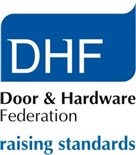
The tragic death of a man crushed by a falling metal gate in County Meath, Ireland on Tuesday (July 26) is a salutary reminder to all those responsible for powered gates of the vital importance of regular inspection and testing of powered gate installations.
The call to powered gate owners, installers, repairers and maintainers to have all gates checked for safe operation has been issued by the Door & Hardware Federation (DHF), the powered gate industry body which is campaigning for higher standards of safety for automated gates and barriers.
The accident happened at the delivery entrance to a retail centre. The victim, a man in his 40s, was found pinned to the ground under the large rolling gate. This appeared to have fallen off its guide track and toppled over. An inspection of the gate is being made by the Health and Safety Authority.
Said DHF training officer Nick Perkins: “At this stage we can’t speculate on the exact cause of the incident, but photographs taken at the scene show an upper guide roller lying on the floor next to the fallen gate. There appears to be no evidence of any physical travel stops for the stricken gate leaf. Structural failure like this is the most common cause of accidents with both manual and automated gates.
“This dreadful accident is a stark reminder of the vital need for regular inspection and testing of all powered gate installations.”
He said regular planned preventative maintenance is absolutely essential if a gate is to remain in a safe and serviceable condition. This should include detailed inspection of all elements of the gate together with any necessary adjustment, cleaning, lubrication and performance (force) testing of automation safety systems.
Six adults and three children have been killed in accidents caused by badly installed and poorly maintained gates and barriers in the UK and Ireland in recent years. It is estimated that only 30% of the 500,000 automated gates in service in the UK are safe to use.
The DHF, which represents the leading manufacturers, suppliers, installers and maintainers of powered automatic gates and gate automation equipment, set up its Powered Gate Group in 2010 to raise safety standards in the industry.
Added Nick Perkins: “Correctly installed and regularly maintained powered gates are perfectly safe to use. But like any machine, they can be dangerous if they are not installed or maintained to the highest standards. Our industry is absolutely determined to confine tragic accidents like this latest one in Ireland to the history books.”
The DHF has made tremendous strides in raising powered gate safety standards since 2010. It provides in-depth training covering all aspects of powered gate safety. More than 700 powered gate installation engineers have successfully gained the Powered Gate Safety Diploma qualification.
The federation has recently published DHF TS 011:2016 which is a code of practice covering the safe installation, repair and maintenance of powered gates and traffic barriers. It is designed to reduce the risks associated with powered gates to as low as is reasonably practicable. In partnership with DHF, the National Security Inspectorate (NSI) now offers 3rd party independent auditing of powered gate and barrier work against the DHF code. The NSI is the UKAS-accredited certification and inspection body which audits security and safety providers.
Every year the DHF runs Gate Safety Week, a campaign to create awareness of the need for correct installation and maintenance of powered gates. This year’s Gate Safety Week runs from October 10 – 16. Visit www.gatesafetyweek.org.uk for more information.
Detailed guidance on powered gate safety can be found on www.dhfonline.org.uk .
